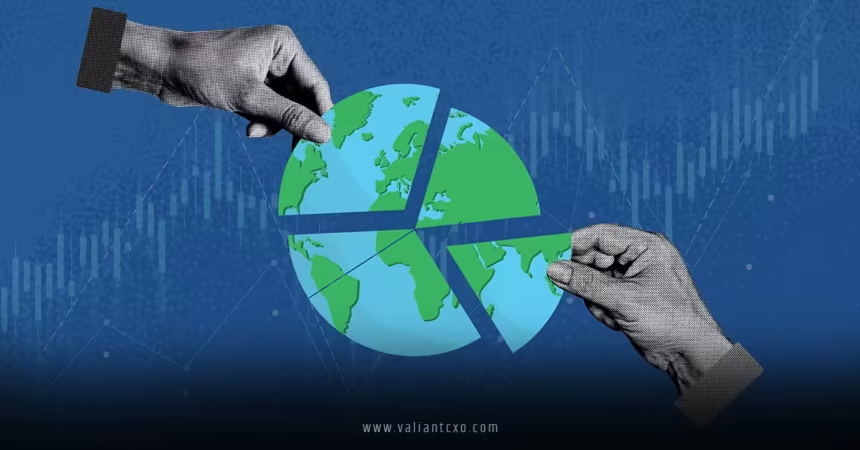How Geopolitical Risks are Redefining Economic Strategy isn’t just a catchy phrase—it’s a reality reshaping the world of global economics. Picture this: you’re a business leader plotting your next big move, only to realize the world’s political chessboard is shifting beneath your feet. From trade wars to sanctions, from regional conflicts to shifting alliances, geopolitical risks are no longer distant headlines—they’re direct players in how businesses, governments, and even individuals plan their economic futures. In this article, we’ll dive into the nitty-gritty of how these risks are forcing a rethink of economic strategies, and trust me, it’s a wild ride.
What Are Geopolitical Risks, Anyway?
Before we get into the meat of How Geopolitical Risks are Redefining Economic Strategy, let’s break down what we mean by geopolitical risks. These are the uncertainties and disruptions caused by political actions, conflicts, or instability that ripple across borders and economies. Think of them as the unpredictable storms in the global economic ocean—trade disputes between the U.S. and China, Russia’s maneuvers in Ukraine, or even Brexit’s messy fallout. These events don’t just stay in their lanes; they mess with supply chains, currencies, and investor confidence worldwide.
Why should you care? Because these risks aren’t just for diplomats to worry about. They hit your wallet, your business, and your country’s economy. When tensions flare, oil prices spike, shipping routes get blocked, or sanctions kick in, the effects cascade down to everyday life. Understanding these risks is the first step to navigating the new economic landscape.
The Domino Effect of Geopolitical Tensions
Geopolitical risks are like dominoes—one falls, and the whole line tumbles. Take the U.S.-China trade war, for example. When tariffs were slapped on billions of dollars’ worth of goods, companies had to scramble. Some moved factories to Vietnam or Mexico, others ate the costs, and consumers ended up paying more for everything from sneakers to smartphones. That’s How Geopolitical Risks are Redefining Economic Strategy in action—businesses had to pivot fast or risk getting crushed.
Or consider the Russia-Ukraine conflict. Sanctions on Russian energy sent shockwaves through global markets. European countries, heavily reliant on Russian gas, faced skyrocketing energy costs, forcing them to rethink energy policies and diversify suppliers. These examples show how a single geopolitical event can force entire industries to rewrite their playbooks.
How Geopolitical Risks are Redefining Economic Strategy for Businesses
Businesses, big and small, are feeling the heat. How Geopolitical Risks are Redefining Economic Strategy for them boils down to adaptability. Gone are the days when you could bank on stable trade routes or predictable markets. Now, it’s all about resilience and quick thinking.
Supply Chain Shake-Ups
Remember when the Suez Canal got blocked by a giant ship in 2021? That was a wake-up call. Geopolitical risks, like regional conflicts or trade restrictions, can choke supply chains overnight. Companies are now diversifying suppliers, bringing manufacturing closer to home (hello, nearshoring!), and investing in tech to predict disruptions. It’s like building a lifeboat before the storm hits.
For instance, automakers hit by chip shortages during U.S.-China tensions didn’t just sit around. They started securing alternative suppliers and even redesigning products to use fewer chips. That’s not just a reaction—it’s a whole new economic strategy driven by geopolitical realities.
Risk Management Overhaul
Geopolitical risks have also pushed businesses to beef up their risk management. It’s no longer enough to have a plan B; you need plans C, D, and E. Companies are hiring geopolitical analysts, using AI to model scenarios, and stress-testing their finances against “what-if” situations. Imagine running a company like you’re playing a high-stakes game of chess, anticipating your opponent’s moves three steps ahead—that’s the new normal.
Governments and How Geopolitical Risks are Redefining Economic Strategy
Governments are no strangers to geopolitical chess games, and How Geopolitical Risks are Redefining Economic Strategy for them is a masterclass in balancing power and prosperity. From sanctions to trade pacts, their moves shape the global economy.
Strategic Trade Policies
Trade policies are now weapons in the geopolitical arsenal. Countries are using tariffs, sanctions, and trade agreements to flex their muscle or protect their interests. The U.S., for example, has leaned on export controls to limit China’s access to advanced tech like semiconductors. This isn’t just about economics—it’s about national security. Meanwhile, nations like India are capitalizing on global tensions by positioning themselves as alternative manufacturing hubs. Smart, right?
Economic Diversification
Geopolitical risks have also lit a fire under governments to diversify their economies. Look at Saudi Arabia’s Vision 2030. They’re not just banking on oil anymore; they’re pouring billions into tourism, tech, and renewable energy. Why? Because relying on a single resource in a volatile world is like putting all your eggs in one basket during an earthquake. Diversification is how countries are hedging against geopolitical shocks.
Investors and the New Economic Playbook
If you’re an investor, How Geopolitical Risks are Redefining Economic Strategy is practically your daily mantra. Markets hate uncertainty, and geopolitical risks are uncertainty’s best friend. But smart investors are adapting, and here’s how.
Safe Havens and Diversification
When geopolitical tensions flare, investors flock to safe havens like gold, U.S. treasuries, or even cryptocurrencies (yes, really!). But it’s not just about hiding money under the mattress. Diversifying portfolios across regions, industries, and asset classes is key. For example, instead of betting big on one country’s stock market, investors are spreading their bets globally to cushion the blow of regional instability.
ESG and Geopolitical Awareness
Environmental, Social, and Governance (ESG) investing is also getting a geopolitical twist. Investors are factoring in how companies handle geopolitical risks—do they have ethical supply chains? Are they exposed to volatile regions? It’s like choosing a hiking partner who’s prepared for sudden storms, not just sunny days. This shift is redefining how capital flows and which companies thrive.
Everyday Impacts: How Geopolitical Risks Hit Home
You might be thinking, “This all sounds like big-picture stuff—how does it affect me?” Well, How Geopolitical Risks are Redefining Economic Strategy isn’t just for CEOs and presidents. It’s in your grocery bill, your gas tank, and your job prospects.
Rising Costs and Inflation
Geopolitical disruptions, like sanctions or blockades, can drive up the cost of everything. When oil prices spiked after tensions in the Middle East, you felt it at the pump. When grain exports from Ukraine stalled, bread prices climbed. These aren’t abstract economics—they’re real-world hits to your wallet. Businesses pass on higher costs, and suddenly, your coffee costs an extra buck.
Job Markets and Opportunities
Geopolitical risks also reshape job markets. As companies nearshore or diversify, new jobs pop up in unexpected places. For example, Mexico’s manufacturing boom, driven by U.S.-China tensions, has created thousands of jobs. But on the flip side, industries tied to volatile regions might cut back. It’s a mixed bag, and staying adaptable is the name of the game.
How to Thrive Amid Geopolitical Risks
So, How Geopolitical Risks are Redefining Economic Strategy isn’t just about surviving—it’s about thriving. Whether you’re a business owner, investor, or just trying to make sense of the world, here are some practical tips.
Stay Informed, Stay Ahead
Knowledge is power. Follow credible sources like The Economist for global insights or Bloomberg for market trends. Understanding the geopolitical landscape helps you anticipate changes, whether it’s a new trade deal or a brewing conflict.
Embrace Flexibility
Whether you’re running a business or managing your finances, flexibility is your superpower. Diversify your suppliers, investments, or even career skills. Think of it like packing for unpredictable weather—bring layers, not just a t-shirt.
Leverage Technology
Tech is a game-changer. Businesses are using AI to predict supply chain snags, while investors rely on algorithms to spot market trends. Even governments are tapping into big data to craft smarter policies. Get on board with tools that help you stay one step ahead.
The Future of Economic Strategy in a Geopolitical World
Looking ahead, How Geopolitical Risks are Redefining Economic Strategy will only get more critical. Climate change is adding new layers of complexity—think resource wars or migration pressures. Meanwhile, tech rivalries, like the race for AI dominance, are creating new battlegrounds. The world’s not getting simpler, folks.
But here’s the silver lining: these challenges are also opportunities. Companies that adapt will find new markets. Investors who stay sharp will spot the next big thing. And governments that innovate will lead the way. It’s like navigating a stormy sea—tough, but those who master the waves come out stronger.
Conclusion
How Geopolitical Risks are Redefining Economic Strategy is more than a trend—it’s a fundamental shift in how the world works. From businesses rethinking supply chains to governments diversifying economies, and investors rewriting their playbooks, geopolitical risks are forcing everyone to adapt or get left behind. The key is staying informed, flexible, and ready to pivot. By understanding these risks and acting proactively, you can turn challenges into opportunities. So, whether you’re running a company, investing your savings, or just trying to keep up with the news, embrace the change—it’s your chance to thrive in a wild, unpredictable world.
FAQs
1. What are some examples of geopolitical risks impacting economic strategy?
Geopolitical risks like trade wars, sanctions, or regional conflicts directly influence How Geopolitical Risks are Redefining Economic Strategy. For instance, U.S.-China tariffs forced companies to relocate factories, while Russia-Ukraine tensions spiked energy prices, prompting new energy policies.
2. How can businesses prepare for geopolitical risks?
Businesses can prepare by diversifying supply chains, investing in risk management tools, and staying informed about global events. Adopting flexibility is key to navigating How Geopolitical Risks are Redefining Economic Strategy effectively.
3. Why do geopolitical risks affect everyday consumers?
Geopolitical risks drive up costs for goods like fuel and food, impacting your wallet. For example, disruptions in global trade can lead to inflation, showing How Geopolitical Risks are Redefining Economic Strategy at every level.
4. How are investors adapting to geopolitical risks?
Investors are diversifying portfolios, seeking safe-haven assets, and factoring in ESG considerations. These strategies reflect How Geopolitical Risks are Redefining Economic Strategy by prioritizing resilience and long-term stability.
5. Where can I learn more about geopolitical risks?
Check out trusted sources like Foreign Affairs for in-depth analysis. Staying informed helps you understand How Geopolitical Risks are Redefining Economic Strategy and its real-world impacts.
Click Here:valiantcxo.com


